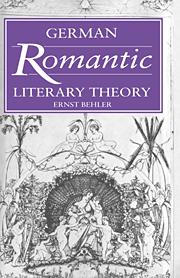Book contents
- Frontmatter
- Contents
- Preface
- List of abbreviations
- Chronology of early Romanticism
- Introduction
- 1 Formation and main representatives of early Romanticism in Germany
- 2 Poetry in the early Romantic theory of the Schlegel brothers
- 3 The theory of Romantic poetry
- 4 Novalis and the mystical dimension of early Romantic theory
- 5 Wackenroder's and Tieck's conceptions of painting and music
- 6 Theory of language, hermeneutics, and encyclopaedistics
- Conclusion: early German Romanticism and literary modernity
- Notes
- Select bibliography
- Index of works cited and primary sources
- Index of subjects and names
5 - Wackenroder's and Tieck's conceptions of painting and music
Published online by Cambridge University Press: 17 August 2009
- Frontmatter
- Contents
- Preface
- List of abbreviations
- Chronology of early Romanticism
- Introduction
- 1 Formation and main representatives of early Romanticism in Germany
- 2 Poetry in the early Romantic theory of the Schlegel brothers
- 3 The theory of Romantic poetry
- 4 Novalis and the mystical dimension of early Romantic theory
- 5 Wackenroder's and Tieck's conceptions of painting and music
- 6 Theory of language, hermeneutics, and encyclopaedistics
- Conclusion: early German Romanticism and literary modernity
- Notes
- Select bibliography
- Index of works cited and primary sources
- Index of subjects and names
Summary
Through Wackenroder and Tieck, early Romantic theory came to embrace painting and music, two forms of art that had never been strongly emphasized by the Jena group. Painting and music were almost completely absent from the early writings of the Schlegels, and although Novalis did give some consideration to these art forms in his fragments, he saw them for the most part in analogy to poetry and never really considered them in their own autonomy. In the critical writings of Wackenroder and Tieck, however, the entire concept of art is no longer envisioned according to a poetic paradigm, but follows the model or, as the two friends preferred to say, language, of painting and music. This new direction in the exploration of art is in itself almost exclusively Wackenroder's achievement. Tieck followed Wackenroder to some extent in this new orientation but was most original and successful when he dealt with these subjects through the medium of his fiction and poetry rather than theoretically. Wackenroder's influence grew incessantly and soon manifested itself in Tieck's Franz Stembald's Wanderings, in August Wilhelm and Caroline Schlegel's dialogue ‘The Paintings’ (AWS SW 9, 3–101), Friedrich Schlegel's descriptions of paintings in his periodical Europa of 1803–5 (KFSA 4), and especially in the predominance of painting and music in the theories of art of later periods of Romanticism.
Initially, these impulses came almost exclusively from a small and unpretentious book with the peculiar title Outpourings of an Art-Loving Friar. By the time it appeared in 1797, Wackenroder, the author, had already died. Out of respect for Wackenroder's father, who would have disapproved of his son's career as a writer, Tieck published the text anonymously.
- Type
- Chapter
- Information
- German Romantic Literary Theory , pp. 222 - 259Publisher: Cambridge University PressPrint publication year: 1993



